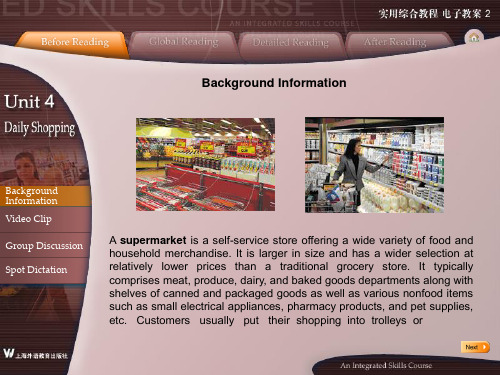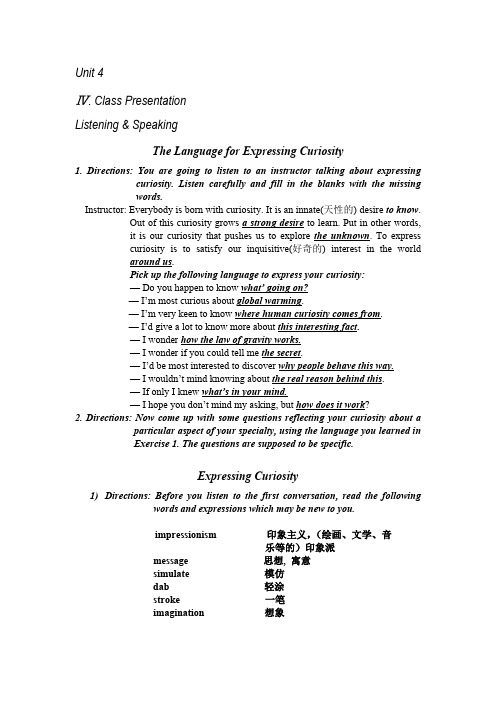实用英语综合教程2Unit4
实用综合教程2Unit4DailyShopping

Unit 4Daily ShoppingSection I Listening and SpeakingI Teaching Objectives1. To grasp the main teaching objectives of Unit 4.2. To be able to talk about daily shopping.3. To study the new words and expressions of Text A.II Teaching ProceduresStep 1 Introduce the main teaching objectives of this unit briefly. And lead Ss to get to know the theme of this Unit.Step 2 Listening Practice1. Play the recording of Practice A---Short Dialogues, Ss try to choose the best answer to the questions they hear.Questions:1) Where does the conversation most probably take place?2) What does the man mean?3) When does the conversation most probably take place?4) Why does the woman suggest a toy train?5) What does the man want to buy?Key: C A B C D2.Play the recording of Practice B---Short conversation, Ss try to choose the bestanswer according to what they have heard.Questions:1) Where is Harold’s located?2) What is the food hall of Harold’s noted for?3) What does the Egyptian hall look like to the customers?4) About how many customers come to Harold’s on an average day?5) How much do customers spend on an average day?Key: C AC B D3.Play the recording of Practice C---Dictation, Ss try to fill in the blanks in thepassage according to what they have heard.Before listening, give students 2 minutes to read through the passage and try to get familiar with the following words and phrases (Both pronunciation and Chinese meaning) to get better performance.average, housewife, products, supermarketKey: 11. spends 12. to buy food 13. for a while14. outside 15. FrequentlyStep 3 Speaking Practice --- Daily ShoppingDiscussion1. Divide the Ss into groups. Each group should have no more than six students.2. Appoint a leader for each group.3. Encourage the Ss to take turns speaking in the discussion.4. Encourage the Ss to have their own ideas.Presentation1. Invite one student from each group to present the ideas of the group to the whole class.2. Encourage the Ss to speak rather than read their notes.3. After the presentations, the teacher may sum up and give some comments.Step 4 New Words and Expressions of Text A1. mall n.购物中心,商场e.g. It is, in effect, an outdoor shopping mall.确切地说,它是一个户外购物商场。
21世纪大学实用英语综合教程2 Unit 4

I. Objectives II. Suggested Teaching Plan III. Background Information IV. Class Presentation
Unit 4 Conquering Illnesses
Part I Listening Part II Reading Part III Speaking Part IV Translation & Writing Part V Time to Relax Video Exercises
Unit 4 Conquering Illnesses
Time Contents
1 period Themerelated Listening
3 periods
Review of Themerelated Listening Sections
Plan
E. plays the second dialogue once, or twice if necessary, and then asks students to do the listening comprehension exercises;
exercises, focusing on certain items or leaving some exercises as the students’ homework according to the students’ levels.
Unit 4 Conquering Illnesses
1 period Speaking
The teacher A. fully understands what the exercises are
实用英语综合教程2Unit4

baskets and pay for them at the checkout. A larger supermarket combined with a department store is sometimes known as a hypermarket.
Background Information Video Clip Group Discussion Spot Dictation
Video Clip Questions:
1. Why are supermarkets today continually expanding, specializing and reorganizing?
Key
Background Information Video Clip Group Discussion Spot Dictation
Video Clip Source
Supermarket Bits -- Meridian
For video script, please scroll down the page.
Background Information Video Clip Group Discussion Spot Dictation
The next lesson is that women never follow a logical route when
shopping. Your wife has disappeared before you know it. After ten minutes of searching, when you finally find her in a far corner, she enquires: “Where have you been all this time, dear?” Supermarket managers are sent on courses to learn how to tempt the customers and persuade them to buy goods they do not really need, at prices they are not able to afford. As a newcomer, I am often taken in by their clever techniques, as I take many goods off the shelves. But I am often discouraged by my wife. “Put it back, dear”. “You’ve tried that before and didn’t take to it”. “No, it’s too expensive”.
新编实用英语综合教程2_unit_4 (课堂PPT)

离开房间时请把钥匙留在房里。
12
10. instruction
(n.) a statement or guidance, telling people what they should do 指示,说明
Eg. Please maintain a close contact.
9
7. lounge
(n.) room in a hotel, club, etc. where people sit & relax 休息室,小客厅
Eg. In the lounge of the hotel, drinks are usually more expensive than in other places.
Eg. Follow the instructions on the packet(包装) carefully.
13
11. emergency
(n.) an unexpected & difficult or dangerous situation 紧急情况
Eg. The plane made an emergency landing.
1. (v.) get in touch, reach by telephone, etc. 联 系
Eg. As soon as we find out anyt.) the act of meeting, touching, or receiving information from someone. 联系
2
II. Words & Expressions
21世纪大学实用英语综合教程(第二册第4单元)

comment despite
pretend enable
pollute cruel
particularly planet
freedom argue
pretending 6. She left the room quietly, not realizing that her son was just _________ to be asleep. ____ 7. It’s a cruel fact that we, human beings, are the ultimate cause of the disappearing animal kingdom(王国). polluted 8. Dianchi, a famous fresh water lake in Yunnan Province, is heavily _______ and officials warn the situation is getting worse. 9. Most poor families in this small village have difficulty sending their children, _________ girls, to school. particularly 10. The teachers have been given much freedom to choose their own textbooks. _______
Supporting Details They don’t dwell on ______________ , nor things of the past in the future plan to live some day __________ ; they live today _____ , this moment, fully, completely, and purely.
复习精华 - 大学英语《综合教程2》Unit4

Have misgivings not be sure
Ex. 我对是否接受那项工作顾虑重重。 I have many misgivings about taking the job.
Fundamental basic
Ex. A knowledge of economics is fundamental to any understanding of this problem. There is a fundamental difference in attitude between these two politicians.
remoteness n.
Regardless of
without taking account of or worrying about Ex. I bought the book, regardless of the cost. Ex. The law requires equal treatment for all, regardless of race, religion or sex.
compromise with; ~ between reach/ come to/ arrive at a ~
find/ work out a ~
make a compromise OPP break a ~
Regarding prep.
21世纪大学实用英语综合教程第二册听力答案及原文(unit4)

Unit 4Ⅳ. Class PresentationListening & SpeakingThe Language for Expressing Curiosity1. Directions: You are going to listen to an instructor talking about expressingcuriosity. Listen carefully and fill in the blanks with the missingwords.Instructor: Everybody is born with curiosity. It is an innate(天性的) desire to know.Out of this curiosity grows a strong desire to learn. Put in other words,it is our curiosity that pushes us to explore the unknown. To expresscuriosity is to satisfy our inquisitive(好奇的) interest in the worldaround us.Pick up the following language to express your curiosity:— Do you happen to know what’ going on?— I’m most curious about global warming.— I’m very keen to know where human curiosity comes from.— I’d give a lot to know more about this interesting fact.— I wonder how the law of gravity works.— I wonder if you could tell me the secret.— I’d be most interested to discover why people behave this way.— I wouldn’t mind knowing about the real reason behind this.— If only I knew what’s in your mind.— I hope you don’t mind my asking, but how does it work?2. Directions: Now come up with some questions reflecting your curiosity about aparticular aspect of your specialty, using the language you learned inExercise 1. The questions are supposed to be specific.Expressing Curiosity1)Directions: Before you listen to the first conversation, read the followingwords and expressions which may be new to you.impressionism 印象主义,(绘画、文学、音乐等的)印象派message 思想, 寓意simulate 模仿dab 轻涂stroke 一笔imagination 想象Listen to the conversation twice and fill in the blanks with the missing Words.Wang Ying: Look at this picture. You’ve got to be smart enough to understand this. It’s really beyond me.Li Ming:I seem to know little about impressionism. I’m struggling to get its message.Wang Ying:Are you? I’m most curious about it, too. Is this a French painter or a Chinese one?Li Ming:It must be a French painter.Wang Ying:How do you know that?Li Ming:By the name.Wang Ying:Ah. Do you happen to know what these natural appearing objects in unmixed colors mean?Li Ming:I don’t know. Maybe they’re meant to simulate actual reflected light.Wang Ying:Wow. I hope you don’t mind my asking, but what are these dabs and strokes trying to tell us?Li Ming:Use your imagination.Wang Ying:Mmm-hmm… their open possibilities probably reflect the beauty of impressionism. Right?Li Ming:I didn’t know you have so much curiosity about impressionism.Wang Ying: Now you know I’m a really inquisitive person!Now listen to the conversation again and answer the following questions.1. Where did this conversation most probably take place?In an art gallery.2. What were they talking about?They were talking about an impressionistic picture.3. What did Wang Ying want to know?She was keen to know about the meaning of the colors, dabs and strokes.4. What did Li Ming ask Wang Ying to do?He asked her to use her imagination.5. What did Li Ming say about Wang Ying?He said that she is an inquisitive person.2) Directions: Before you listen to the second conversation, read the followingwords and expressions which may be new to you.fare 车费fare card 交通卡store 存储subway 地铁scanner 扫描仪beep 电子装置发出的声音Listen to the conversation twice, and then complete the passage according to the conversation you have heard.This was the first time for Kathy to visit the city of Shanghai. She took a bus and paid the exact fare. The bus driver advised her to get herself a fare card. She wondered what it was, whether it could be used on the subway and how it worked on the bus. The bus driver answered her questions and explained the use of the card, satisfying her inquisitive needs.Directions: Listen to the conversation again, and complete the form as the speaker recounts it. After that, act it out in class.Kathy: Excuse me. Do I have to pay the exact fare for the bus?Bus Driver: Yes, you do. It’s two yuan. Put the coins into the slot of the box.The passenger sits near the bus driverBus Driver: You ought to get yourself a fare card.Kathy: What’s that?Bus Driver: It’s a stored value card. You can use it on the bus.Kathy: I wonder whether I can use it on the subway.Bus Driver: Sure can. And also on a taxi.Kathy: This is my first time to visit the city of Shanghai.Bus Driver: Welcome to Shanghai.Kathy: Thanks. I hope you don’t mind my asking, but how does the fare card work on the bus?Bus Driver: There’s a scanner by the door. Did you see it?Kathy: Yes.Bus Driver: You just place your card on the device. When you hear the beep, you’ve paid.Kathy: Thank you.Bus Driver: Don’t mention it.4. Express your curiosity about a particular mystery and ask the class to answeryour question. Try to use the language you picked up in Exercise 1.Listening Practice5. Directions: Listen to the following people talking and figure out the best responseto each conversation’s implication.1. M: Just give me your driver’s license, Miss.W: But what did I do? Just tell me that.Q: What’s the relationship between these two speakers?A) A policeman and a thief. B) A judge and a liar(说谎者).C) A policeman and a driver.D) A lawyer and a defendant(被告).2. M: Sure, Anna, come on in. What can I do for you?W: This is a little difficult, so I guess I’ll just speak directly. I’ve been offered another job, and I think I’m going to accept it.Q: What’s the relationship between these two speakers?A) An employer and an employee.B) A manager and a client.C) A professor and a student.D) An examiner and an examinee(参加考试者).3. W: Can you give me anything for the pain?M: Yes, I’ll give you some painkillers. Come back in a week.Q: What’s the relationship between these two speakers?A) A teacher and a pupil.B) A painter and a buyer.C) A doctor and a patient.D) A mechanic(机修工) and a driver.4. W: Can I pay for sale goods by credit card?M: No, it’s cash sale only.Q: What’s the relationship between these two speakers?A) A boss and an assistant.B) A cashier and a businessman.C) A teller(出纳员) and a customer.D) A shop assistant and a customer.5. W: So first I look under ML, then the numbers, then the other letters.M: That’s it. After you find your books, come back to me and We’ll continue your search for periodicals.Q: What’s the relationship between these two speakers?A) A boss and a secretary. B) A librarian and a student.C) A mayor and a citizen(市民).D) A manager and bookkeeper (簿记员).6. Directions: Listen to the following five short dialogues and choose theappropriate answers.1. W: I can’t decide whether to take classes this summer or to find a summer job.M:I think you learn more by working, and you’ll also make money for next semester if you do.Q: What does the man mean?A) Waiting until later to decide. B) Taking summer classes.C) Working and studying. D) Finding a summer job.2. M: I have no idea if they will come to the party or not.W: Don’t worry, we have enough food for all of them.Q: What does the woman mean?A. She will cancel(取消) the party since nobody called.B.She is sure that people will come to the party.C) There is plenty of food for all the people.D) They won’t come if they don’t call.3. W: Mr. Day, I’ve just checked this apartment; the bathroom sink is leaking.M: OK, I’ll have a maintenance man come over to fix it.Q: What will the man do?A) He will ask someone to do the work.B) He will move into the apartment.C) He will buy a new sink. D) He will fix the sink.4. W: I’m going to give away these books. You can have them if you want.M: Are you sure?Q: What is the man implying?A) He is disappointed. B) He is surprised.C) He is anxious. D) He is nervous.5. W: Does this bus go to the Science Museum?M: No, but the next one does. Just wait for a few minutes.Q: What does the man suggest?A) Walk to the Science Museum.B) Wait for the next bus. C) Ask someone else.D) Get on this bus.7. Directions: Listen to the following short story twice. Listen carefully and decidewhether the statements are true (T) or false (F) according to thestory you have heard.cylinder 汽缸spot 发现bike 摩托车garage 汽车修理部straighten up 伸直rag 抹布valve 活门;瓣膜how come…[口]为什么…pittance 少量工资whisper 耳语A mechanic was removing a cylinder head from the motor of a Harley, when he spotted a world-famous heart surgeon in his shop. The heart surgeon was waiting for the service manager to come take a look at his bike. The mechanic shouted across the garage, “Hey, Doc, can I ask you a question?”The famous surgeon, a bit surprised, walked over to the mechanic working on the motorcycle.The mechanic straightened up, wiped his hands on a rag and asked, “So Doc, look at this engine. I also can open hearts, take valves out, fix them, put in new parts and when I finish this will work just like a new one. So how come I get a pittance and you get the really big money, when you and I are doing basically the same work?”The surgeon paused, smiled and leaned over, and whispered to the mechanic: “Try doing it with the engine running!”T 1. The story took place at the mechanic’s garage.___T____ 2. the mechanic was busy fixing a motorcycle.___F____ 3. The mechanic asked the heart surgeon to examine the motorcycle’s “heart”.___T___ 4. The mechanic found it unfair that he earned much less than the surgeon. ___T___ 5. The surgeon made it fair for him to earn much more by pointing out the complexity performing a heart operation.8. Directions: Listen to the following talk and fill in the blanks with the missingwords. The talk is given twice.The world is so bright with color everywhere that it’s hard to imagine that other creatures(动物) don’t see it as we do. But how can we find out whether animals can see color when they cannot tell us?Scientists have made many experiments to get the answer to this. The bee has been the subject(研究对象) of hundreds of these tests, because we have been curious to know whether bees tell flowers apart by their color. In one experiment,a bit of syrup(糖浆) was put in front of a blue card, and no syrup in front of a redcard. After a while, the bees would come to the blue card, no matter where it was placed, even if it had no syrup in front of it. This proved they can tell colors apart.Two strange things were found out about the bee’s ability to see in color.The first is that a bee cannot see red as a color. For a bee, it’s only dark grey or black. The second is that bees can see ultraviolet(紫外线) as a color, while, for human beings, it is just darkness.9. Directions: Listen to the talk again and then answer the following questionsorally.1. What did scientists try to find out?They tried to find out whether animal can see color.2. Why did they use the bees at the subject?Because they were curious to know whether bees tell flowers apart by their color.3. What did they do in the experiment?They put a bit of syrup in front of a blue card, and no syrup in front of a red card.4. What was the result of the experiment?The bees would come to the blue card, no matter where it was placed, even if it had not syrup in front of it.5. What can we learn from the experiment?Bees don’t see colors as we do.10. Directions: Have a discussion on the topic given below。
前景实用英语unit4sportsmanship

Part A Text
On the Meaning of Sports
I have never been a sporty guy. When I was a kid, whenever we played soccer in the neighborhood, the most prestigious position was the offense. Everyone wanted to be the attacker, but only the kids claiming to be the best could play it. I was always stuck with the position of defense, or sometimes even worse, playing the goal-keeper.
Part A Lead in
Task 3 Discuss the following questions.
1. Why do you think people like sports?
Cues: healthy, shape one’s body, teamwork
2. Have you done any crazy things for your idol?
tomorrow morning. The World Cup Final starts at ___2_:0_0___. W: Oh, fair enough. Is the final between Spain and the Netherlands? M: Right. I ___b_e_t___ Spain will win. W: I’m for the Netherlands. M: We’ll see. Hey, why not ___j_o_in___ me hours later? It’ll be more fun. W: I guess so. OK, I’m in. I’ll go to get some sleep. M: Great.
- 1、下载文档前请自行甄别文档内容的完整性,平台不提供额外的编辑、内容补充、找答案等附加服务。
- 2、"仅部分预览"的文档,不可在线预览部分如存在完整性等问题,可反馈申请退款(可完整预览的文档不适用该条件!)。
- 3、如文档侵犯您的权益,请联系客服反馈,我们会尽快为您处理(人工客服工作时间:9:00-18:30)。
Exotic Customs for the New Year
In the US, people on the East Coast can greet the New Year by joining the crowds in Times Square in the heart of New Year city, to watch the lowering of a lighted crystal ball. Every New Year’s Eve, the prominent intersection is the meeting point of more than half a million excited celebrants. It’s at the center of everything and is known for its once-a-year role as the site of a thousand-pound ball up over the square.
It starts it downward move at 11:59 p.m. and people count along as the seconds tick away. When it reaches the bottom, a sign is lighted and people hug and kiss, and wish each other “Happy New Year”. The tradition began in 1907 and grew into a symbol of welcoming in the New Year.
The British people also have a traditional gathering in a square, Trafalgar, in central London. There’s no ball there, but thousands of people gather to hear Big Ben (the clock) announce the arrival of the New Year. The clock, which was built in 1856 and weighs 13 tons, towers over London. It’s famous for its reliability—it’s only broken down once in the past 150 years in 1975.
In addition to the big gatherings, there are New Year customs that are intended to bring good luck for the coming year. In Spain, for example, when the clock strikes mid-night on New Year’s Eve, people eat a grape with every stroke of the clock, 12 in all, to represent each month of the year. Each grape is meant to bring good luck.
The Japanese hang a rope made of straw across the front of their house to keep out evil spirits, thereby bringing happiness and good luck.
The Swiss believe that good luck comes from letting a drop of cream fall on the floor on New Year’s Day. In the past, Romanians had a tradition of listening to see whether farm animals talked on New Year’s Day. If they didn’t hear any animals talking, it was good. If any animals talked, it was bad luck.。
